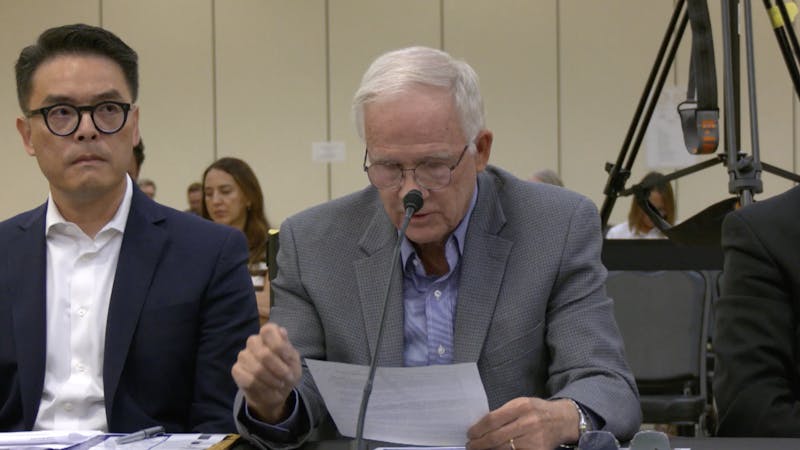Jones School proposes Ph.D.
A doctoral program in management may soon become a reality at Rice. The Graduate Council unanimously approved a proposal for the Ph.D. program put forth by the Jones Graduate School of Management at the end of last semester, Graduate Council chair Jim Faubion said. If approved by the Faculty Senate, the program could improve the Jones School's international reputation, strengthen connections between the Jones School and other academic departments, and provide new research opportunities for undergraduates.
The Jones School is currently the only school at Rice that does not offer a doctorate, and the absence of a Ph.D. program has hurt the School's international standing. Jones School Dean Bill Glick said. Implementing the research-based Ph.D. would greatly increase the Jones School's publication volume, as well as satisfying a popular business school-ranking criterion.
"We get dinged on it every year," Glick said.
The increased visibility and research prestige will also help to attract top tier business faculty, who are in short supply worldwide. A 2003 report from the Association to Advance Collegiate Schools of Business showed there is currently an international shortage of doctoral faculty in business and a growing demand for such faculty. The report inspired the Jones School to act on years of talks about creating a Ph.D. program.
The highest degree the Jones School currently offers is a Masters of Business Administration, which is a non-research based degree.
"The Ph.D. itself is actually much closer to the social sciences," Glick said. "With a business Ph.D., I would say somewhere in the order of 80 to 90 percent go straight into academics. With
an MBA, you are not going in to teach or research; you are going in to learn the business."
While business Ph.D.s are academic research degrees, the coursework that precedes doctoral research is often structured differently than standard doctoral coursework. Most Ph.D. programs require that students take a majority of their classes in their own department, but business Ph.D.s regularly require a completely opposite class structure.
"A [business] Ph.D. student typically takes 60 to 80 percent of the coursework outside the school of business," Glick said. "So we will have a lot of students sitting in [other departments']
Ph.D. classes."
Sharing graduate lectures between multiple departments is not unheard of in most of academia, but it is not the norm.
"It would be odd that more than say 20 percent or 15 percent [of a doctoral candidate's coursework] would be outside of our department," Director of Political Science Graduate
Studies Mark Jones said. "Most departments handle most of their own courses."
Jones said he is not opposed to the idea of integrating business students into political science
graduate courses, but he is concerned that the business students would not have the necessary background.
"Overall, it seems people are supportive of [the Jones School's proposal], but it seems a little strange that so many of the courses are outside [the business school]," Jones said. "It is fine if the students come in at the same level, but you don't want them dragging down your students."
Glick said the integration works both ways, with Ph.D. students outside the Jones School being offered opportunities to take high-level management classes.
"In [other] institutions you've always gotten a lot of non-business students in the business
Ph.D. classes," Glick said.
He said students outside the doctoral program could take advantage of opportunities opened up by the business Ph.D. outside the classroom, as well. Glick said he is particularly interested in undergraduate relations with research in the doctorate program. The newly instituted undergraduate business minor will bring business research to undergraduates' attention, and the Ph.D.'s expanded research programs could afford undergraduate research opportunities.
The Faculty Senate has not yet set a date to discuss the proposal, and if it passes, Glick said the earliest possible launch date for the program is fall 2009.
More from The Rice Thresher

Rice announces Chao College as 12th residential college
Rice announced that the 12th residential college will be named Ting Tsung and Wei Fong Chao College Aug. 19. The college, set to open in fall 2026, will contain nearly 300 on-campus beds.
Dining access fund announced following on-campus unlimited meal swipes
Rice announced new food assistance programs on Tuesday to account for the controversial change in the on-campus meal swipe plan.

Rice disaster prediction model discussed at hearing on deadly Central Texas floods
The House and Senate Select Committees on Disaster Preparedness and Flooding held a hearing on July 31 in Kerrville to address the deadly July 4 flooding in Central Texas. The flooding along the banks of the Guadalupe River killed 108 people, including 37 children. In the charged hearing, Texas lawmakers and flood survivors criticized the local response to the disaster.


Please note All comments are eligible for publication by The Rice Thresher.